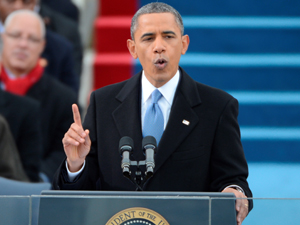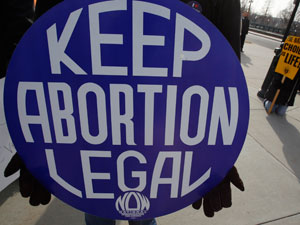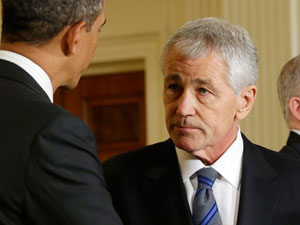
ERA: Once More Unto the Breach? ERA: Once More Unto the Breach?
Now that women will be on the front lines in combat, maybe the country is finally ready to put gender equality in the Constitution.
Jan 30, 2013 / Column / Katha Pollitt
A Message From Americans to France A Message From Americans to France
“As French troops intervene in Mali, the French take pride in their military capacity and in their independence of action.” —The New York Times We’re pleased to hear you like to intervene. We praise both your commitment and your style. Ourselves, we’ve wearied of this sort of thing. Perhaps you could take over for a while.
Jan 23, 2013 / Column / Calvin Trillin

The ‘Sully’-ing of American Journalism The ‘Sully’-ing of American Journalism
Andrew Sullivan garners much attention for his bold moves as a blogger. But what about the quality of his judgments?
Jan 23, 2013 / Column / Eric Alterman

From Seneca Falls to Selma to Stonewall From Seneca Falls to Selma to Stonewall
President Obama’s symbolic recognition of minorities isn’t a substitute for policy, but it does matter.
Jan 23, 2013 / Column / Melissa Harris-Perry
Results of a Survey Asking the American People How They Feel About the Unending Discussion of the Fiscal Cliff, the Debt Ceiling, Restructuring Entitlements, Revenue Versus Spending, Etc., Etc., Etc. Results of a Survey Asking the American People How They Feel About the Unending Discussion of the Fiscal Cliff, the Debt Ceiling, Restructuring Entitlements, Revenue Versus Spending, Etc., Etc., Etc.
The subject is vital. We never would doubt it. We’d rather go broke, though, than hear more about it.
Jan 16, 2013 / Column / Calvin Trillin

The Message and the Meaning: Is ‘Pro-choice’ Passé? The Message and the Meaning: Is ‘Pro-choice’ Passé?
Planned Parenthood has concluded that “choice” is not always the best rallying cry. But it can still pack a punch.
Jan 16, 2013 / Column / Katha Pollitt

Guns, Democracy and the Supreme Court Guns, Democracy and the Supreme Court
The Roberts Court has shifted away from the very collective values and ideas that will be necessary to enact—and uphold—crucial policies on guns and mental health.
Jan 16, 2013 / Column / Patricia J. Williams
The Nomination of Chuck Hagel for Secretary of Defense The Nomination of Chuck Hagel for Secretary of Defense
Opponents think that Hagel should Be more respectful of Likud. And on Iran, whose nuke we’re battling, He’s shown no zest for saber rattling. The first fight for this loyal lieutenant Won’t be abroad but in the Senate.
Jan 9, 2013 / Column / Calvin Trillin

Hooray for Hagel Hooray for Hagel
Rarely has the McCarthyite smear of “anti-Semitism” been revealed to be so empty as in the case of Obama’s DoD nominee.
Jan 9, 2013 / Column / Eric Alterman

Suffer the Children Suffer the Children
Reuters/Shannon Stapleton The day after Barack Obama won the 2008 South Carolina primary, an elderly white woman tendered words of affection to my 11-month-old son. I smiled, but was thinking, Wait until he’s 15, lady, and you’ll be crossing the road to avoid him. There can be few less generous responses to an expression of human kindness. For all I knew, she could have been one of the 10 percent of white female Democratic primary voters in the state who backed Obama, some of whom had chanted “Race Doesn’t Matter” at his victory celebrations the night before. And even if she wasn’t, odds don’t justify prejudice; they simply compound it. Nonetheless, through those earlier years of parenting I would often wonder, as the cooing started, how a world so enthralled by this black baby could create a system so likely to jail or kill him as an adult. As cynical as my response may have been, it was not without foundation. For there is something about children that can, if only momentarily, unlock an aspect of people’s humanity and, therefore, progressive political potential that would otherwise remain inaccessible. A child’s presence, and fate, can make hardened positions soften and hot potatoes cool. Take gun control. On the day registration opened at the 2012 National Rifle Association convention, the face of George Zimmerman—Trayvon Martin’s killer—peered from every newsstand following his arrest. But the prospect of gun control seemed as remote as ever. The July day a gunman sprayed a movie theater in Aurora, Colorado, with gunfire, killing twelve people and injuring fifty-eight, Barack Obama said, “There are going to be other days for politics. This is…a day for prayer and reflection.” In the months of electoral politics that ensued, the day when the candidates would seriously discuss gun control never arrived. It would take a shooter walking into an elementary school in Newtown, Connecticut, and killing twenty children and six adults and injuring two more before the nation’s political class became sufficiently emboldened to take on gun manufacturers and their advocates. It was as though the country just couldn’t see the problem clearly enough until a large number of children had suffered. “Seeing the massacre of so many innocent children, it’s changed, it’s changed America,” said West Virginia’s Democratic senator, Joe Manchin. “We’ve never seen this happen.” The British hacking scandal involving Rupert Murdoch’s News International revealed a similar tipping point. For several years a range of celebrities, royal figures and politicians claimed their phones had been hacked by the News of the World tabloid. The paper’s royal editor and a private investigator were convicted and imprisoned. Some prominent figures settled out of court. Murdoch looked like he would tough it out. Then came news that the paper had hacked into the phone messages of Milly Dowler, a 13-year-old girl who had gone missing and, it later turned out, had been murdered. Before the week was out, Murdoch announced the closing of Britain’s oldest and most profitable weekly newspaper. Within ten days, Prime Minister David Cameron launched an independent public inquiry into an issue he had previously deemed insignificant. Once again, it took childhood to force a longstanding, and apparently chronic, problem into a crisis worth engaging. This is not to suggest that children should not constitute a special protected category. As minors, they are the most vulnerable and the most in need of protection, both by and from their parents and the state. The fact that they are children means they have had no say in how the world they live in has been constructed or what the ground rules are. There is pathos in their pain and thus more intense outrage at those who would torment, harm or exploit them. Indeed, when one sees the reflexive empathy in response to children’s suffering one cannot but hope that it will be exported to the drone victims in Pakistan and the children bombed in Gaza, triggering a breakthrough in foreign policy. But there is something about a culture—in the West, not just the United States—where children must be imperiled in order to take overdue action that betrays a lack of political courage and imagination. Does it take such a leap of logic to grasp that adults who are shot or whose phones are hacked were once infants themselves, that many of them may have children of their own, or that these issues and many more have an impact on children even when they are not immediately affected? To be raised in a society where phones may be hacked and people may be shot is to be raised with a diminished sense of your own humanity. This is not a partisan point, although those who are passionate about the rights of the unborn while seeking to deny food stamps, healthcare and education for the newborn and young deserve particular contempt. Arguably, if it takes children’s suffering to get things moving, then at least something positive can emerge from tragedy. The Obama administration is reportedly acting swiftly to impose some kind of gun regulation before the horror of the Newtown shootings fades from public memory. But the truth is that there is nothing swift about it. Had they been swift, their actions might have prevented the tragedy rather than been prompted by it. The reason it’s a bad idea to have assault weapons freely available is not because they can kill children. It’s because they can kill lots of people quickly, including children. The reason phone hacking is a bad idea is not because it hurts children. It is because it invades privacy, including that of children. If these calamities have to be visited on children before they can be addressed, we should at least drop the pretense that we are doing it for the children. For if we have to wait until children are directly and adversely affected before we act, then we seek not to protect them, but to put them in harm’s way. Gary Younge’s last column was about “The Irony of Right-Wing Secessionist Fantasies."
Jan 9, 2013 / Column / Gary Younge
